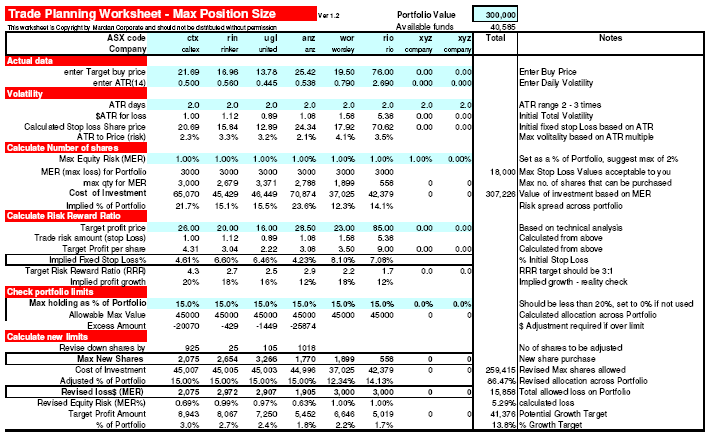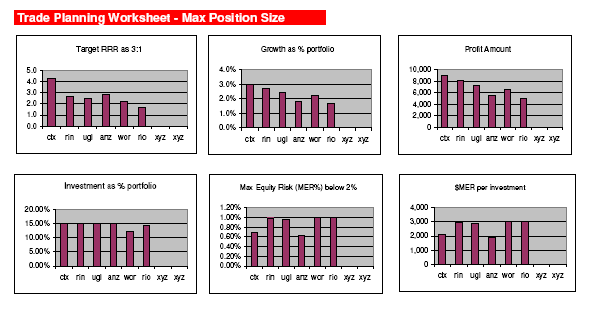

- Which stocks to select from multiple choices
- How much to spend given your portfolio limits then
- How much you are prepared to lose if you are wrong and
- At what price to set your fixed initial stop losses.
To read more about Trade Management and Money Management refer to the articles in the Traders University


- The key assumptions you need to establish are: Your available funds, your Maximum Equity Risk (MER)% (the amount you are prepared to lose from any trade) and your maximum position size per trade as a % of the portfolio.
- The key inputs there after are: The target price, the shares ATR (average true range, or volatility - which OmniTrader or your share software will provide), your estimate of the target price you expect the share may reach (based on your technical charts)
- The key outputs are: The number of shares you should buy, the expected RRR (Risk Reward Ratio) and the MER (maximum Equity Risk for your portfolio). The model uses your assumptions to determine the maximum number of shares you should buy based on all input variables.
- The ATR (Average True Range) for determining the initial fixed stop loss should be no more than 3 (OmniTrader will provide this for you)
- Aim for a RRR (Risk Reward Ratio) of 2:1 or more. Many experts say that 3:1 should be the goal - which means that target profit should be at least 3 times the initial risk (OmniTrader can plot this on a chart)
- The MER (maximum Equity Risk) should not be more than 2% of the portfolio in any one trade - and less for highly volatile positions
- The Maximum Position Size for any share as a % of the total portfolio should not be more than say 15-20% and even less for large portfolios or speculative stocks
Average True Range represents the volatility of the selected bar as calculated using Wilder's Volatility and based on information over the previous 14 bars of data. [This information is available on the chart screen in OmniTrader]. Its the average range a share will trade within on a day using the last 14 days to calculate the volatility.
-
DefaultóUses a simple Fixed Loss Stop (2 ATRís) and a Fixed Profit Stop (2 ATRís) to manage a trade.
-
Eighthís StopóUses a Fixed Loss Stop (3 ATRís) as a protective stop and an Eighthís Tool Stop (1.5 ATRís) as a profit stop.
-
Eighthís Stop-Partial ExitóUses a Fixed Loss Stop (3 ATRís) as a protective stop and exits half the trade once price hits a Fixed Profit Stop (1.5 ATRís). This Trade Plan manages the remaining half of the trade with a 1.5 ATR Eighthís Stop.
-
Long Term TrendingóUses a Fixed Loss Stop (3 ATRís) as a protective stop and a Trailing Profit Stop (Threshold = 4 ATRís, Cushion = 3 ATRís) as a profit stop. It will also activate a Break Even Stop (1.5 ATRís) once price exceeds 2 ATRís to the gain side.
-
Medium Term TrendingóUses a Fixed Loss Stop of 3 ATRís as a protective stop and a Trailing Profit Stop (Threshold = 3 ATRís, Cushion = 2 ATRís) as a profit stop.
-
Partial ExitóUses a Fixed Loss Stop (2 ATRís) as a protective stop, and it will exit 50% of the initial position if price hits a Fixed Profit Stop of 2 ATRís. The remainder of the trade is managed with a Trailing Profit Stop (Threshold = 2 ATRís, Cushion = 2 ATRís).
-
Short Term TrendingóUses a Fixed Loss Stop (2 ATRís) as a protective stop, and a Trailing Profit Stop (Threshold = 2 ATRís, Cushion = 1.5 ATRís) as a profit stop.